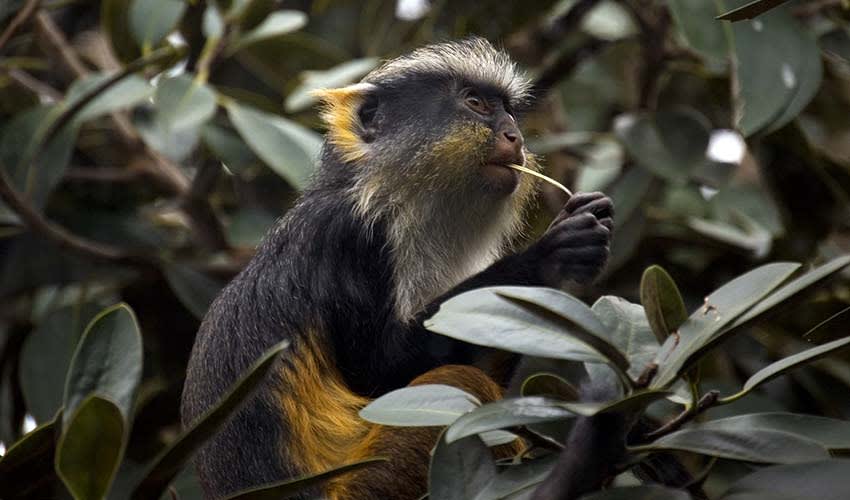What makes it instantly recognizable is the small crest of hair on its forehead, which gives it a slightly punkish look, paired with a mix of bright fur patterns that make it look like it’s dressed for a masquerade ball. Its face is framed by white fur with a pale nose stripe, while the rest of its coat blends reddish-browns, blacks, and grays, creating one of the most striking designs among African monkeys.
Unlike the shy and secretive Owl-faced monkey, the Crested mona monkey is highly social and lively. These monkeys live in large groups and spend much of their time chattering, grooming, and leaping between trees. They are true canopy dwellers, rarely coming to the ground, and their long tails give them excellent balance as they bound from branch to branch. They’re known for forming mixed-species troops with other monkeys, such as colobus or other guenons, which provides extra safety in numbers and creates bustling, noisy forest communities.
Crested monas are omnivores, feeding on fruits, seeds, flowers, insects, and the occasional small animal. This flexibility allows them to thrive in diverse habitats, from lowland rainforests to swamp forests. By eating fruit and dispersing seeds, they also act as important gardeners of the forest, helping keep the ecosystem healthy and thriving.
And of course, there are the fun and quirky details that make this species stand out. Their elaborate facial markings and little crest have earned them the nickname “masquerade monkeys.” They’re also excellent vocalists, producing a wide range of calls to keep their group members in touch. Watching them leap and play high in the canopy feels like watching a troupe of acrobats putting on a nonstop show.
Distribution
 Angola
Angola Cameroon
Cameroon Central Af. Rep.
Central Af. Rep. Congo-Brazzaville
Congo-Brazzaville DR Congo (Kinshasa)
DR Congo (Kinshasa) Equatorial Guinea
Equatorial Guinea Gabon
GabonAnything we've missed?
Help us improve this page by suggesting edits. Glory never dies!
Suggest an editGet to know me
Terrestrial / Aquatic
Altricial / Precocial
Polygamous / Monogamous
Dimorphic (size) / Monomorphic
Active: Diurnal / Nocturnal
Social behavior: Solitary / Pack / Troop
Diet: Carnivore / Frugivore / Omnivore / Piscivorous / Insectivore
Migratory: Yes / No
Domesticated: Yes / No
Dangerous: Yes / No




